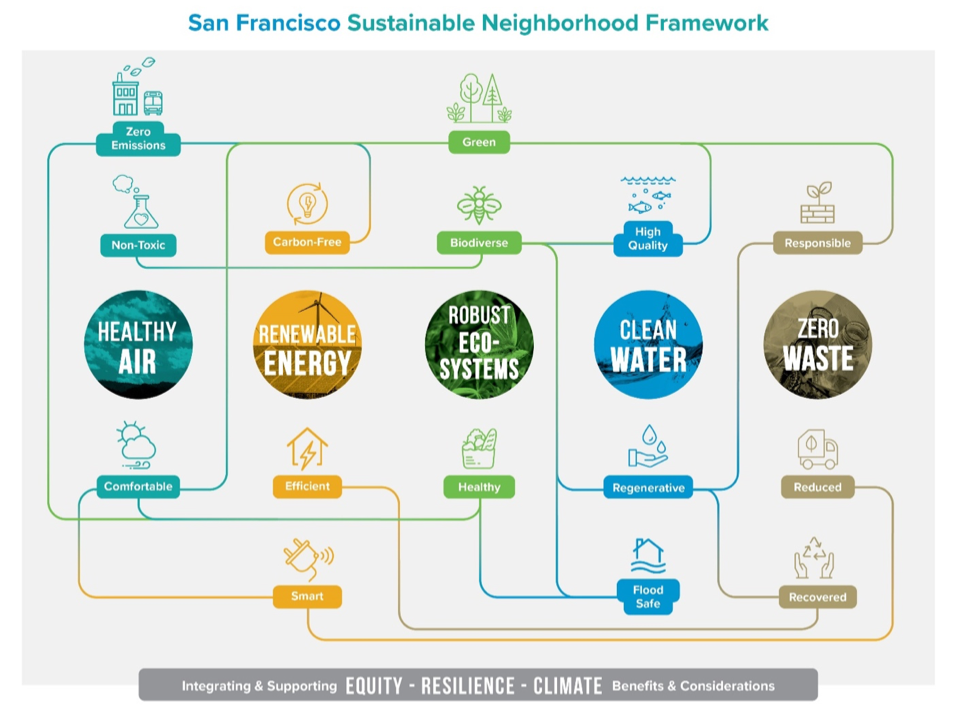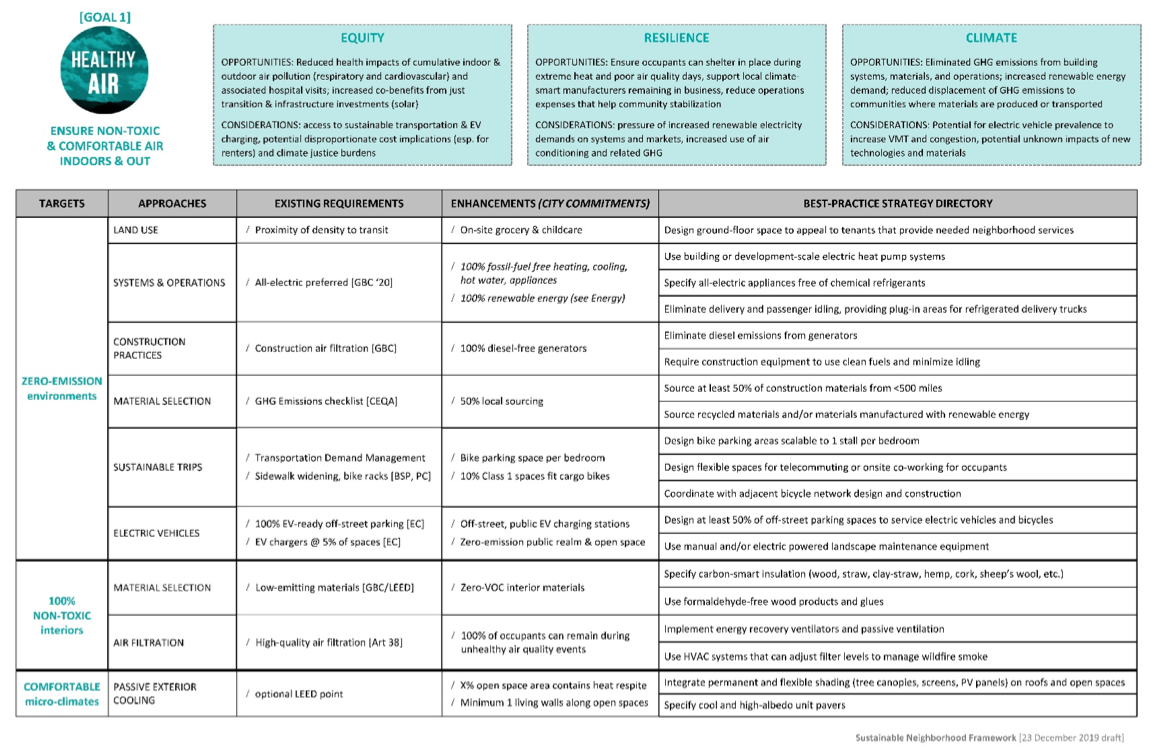
Sustainable Neighborhood Program
The Sustainable Neighborhood Program is a framework and supportive tool kit that provides a comprehensive approach to amplifying environmental performance, quality of life, and community co-benefits in any plan or project. Project sponsors, City staff, community groups, and individual property owners may use these tools to leverage public and private investments in the built environment to realize and support these citywide priorities.
Background and Drivers
Today’s global climate crisis expands the need to help reduce global heating through greenhouse gas emissions reductions (mitigation) and protect the City and its people from the unavoidable impacts of climate change (adaptation).
Although numerous City plans, policies, and regulations support these and other environmental aims, they are distributed across multiple documents and City codes. This can result in missed opportunities for projects to increase their level of sustainability and resilience, as well as support equity, affordability, housing, financing, and other current challenges.
Principles and Benefits
The development of the Program’s Framework and tools was guided by five key principles: (1) people-centered, (2) built on best practices, (3) effective & efficient, (4) compelling & easy-to-use, and (5) flexible/scalable. In terms of benefits, the Sustainable Neighborhood Framework will:
- Provide a vision and set of priorities for sustainable development throughout the City;
- Identify and leverage system-based approaches to regulatory compliance to exceed minimum standards, benefit other aims, and achieve net-positive results; while remaining cost neutral;
- Help identify opportunities, constraints, best practices, and potential partnerships for success;
- Advance equity and climate resilience through the thoughtful, integrated, and innovative pursuit of environmental sustainability regulations; and
- Streamline inter-agency review by providing a consistent platform for iterative design and decision making with project sponsors around environmental sustainability topics.
The materials that have evolved over the past four years are the result of collaborations with partner agencies on our eco-district work (such as the Central SoMa Area Plan and Mission Rock), build on the 2014 Sustainable Systems Framework, and incorporate global best practices.
The Program has been particularly inspired by the opportunities and challenges presented in both the Department’s area planning and participation in the design, review, and approval processes associated with major development projects. Currently, the Sustainable Neighborhood Program includes a Framework and three tools (to be posted soon): A program summary document, roadmap (project worksheets), and an online guide.
January 9, 2020: The Sustainable Neighborhood Program was presented to the Planning Commission as an informational item. Please use these links to view the case report and presentation. Staff will return towards the end of Spring 2020 with a proposed Planning Department resolution for the Commission’s consideration.
January 2020: One of the Sustainable Neighborhood Framework’s key pilot projects (Potrero Power Station) was presented at the Planning Commission for approval.
January 2020: The Market-Octavia Plan amendments were also introduced, which include language around sustainability and resilience per the SNF goals.
May 2020 The Planning Commission certified the project EIR and adopted project approval documents for Balboa Reservoir, a major development project piloting the framework.
Planning Commission Informational Presentation and Case Report - January 9, 2020
Community Plans & Major Development Projects
As illustrated in Figure 1 below, the Vision Framework is centered on five clear goals for projects and neighborhoods to achieve through the pursuit of 15 targets/objectives. Each of the goals (and targets) aligns with a current City commitment or initiative:
- Healthy Air (zero emissions, non-toxic, comfortable)
- Renewable Energy (carbon-free, efficient, smart)
- Robust Ecosystems (green, biodiverse, healthy)
- Clean Water (high-quality, regenerative, flood-safe)
- Zero Waste (responsible, reduced, recovered)
The Framework also embeds three critical imperatives for projects to review, understand, and support to the fullest extent possible though strategy development and implementation:
- Equity Adopting more sustainable practices can help address health and prosperity disparities faced by communities of color and other vulnerable citizens. Sustainability strategies should be pursued with thoughtful procedural, structural, and distributional considerations, and explicitly intend to benefit and not burden vulnerable populations.
- Climate Most sustainability strategies and actions for buildings, transportation, waste, and greening can be pursued in ways that also reduce carbon emissions, which in turn reduces global heating. If not implemented thoughtfully, strategies seeking to benefit resilience/adaptation could inadvertently increase emissions (e.g., natural gas HVAC systems for air conditioning).
- Resilience Resilient communities include people, buildings, and infrastructure that can withstand and recover from severe shocks and slower-to-accumulate stressors. As the effects of climate change are already here, investing in resilience today protects against current challenges (often while reducing energy and operational expenses) while reducing costly future repairs.

The Sustainable Neighborhood Roadmap is a set of five worksheets, one for each goal. Each table is organized around the three targets (a.k.a. objectives) relevant to that goal.
As shown in the figure below, the columns summarize core approaches or pathways through which the project can achieve the targets, key existing requirements, priority enhancements the City urges the project to achieve, and recommended best-practice strategy directory. Given today’s quickly evolving technologies and products, the Roadmap is purposefully non-prescriptive about how projects achieve the goals and targets; provided strategies are merely a starting place and innovation is strongly encouraged. Please see the Community Plans and Major Development Projects webpage for example applications and pilot projects .

Danielle Ngo
Senior Planner, Resilience + Sustainability
danielle.ngo@sfgov.org
628.652.7591
